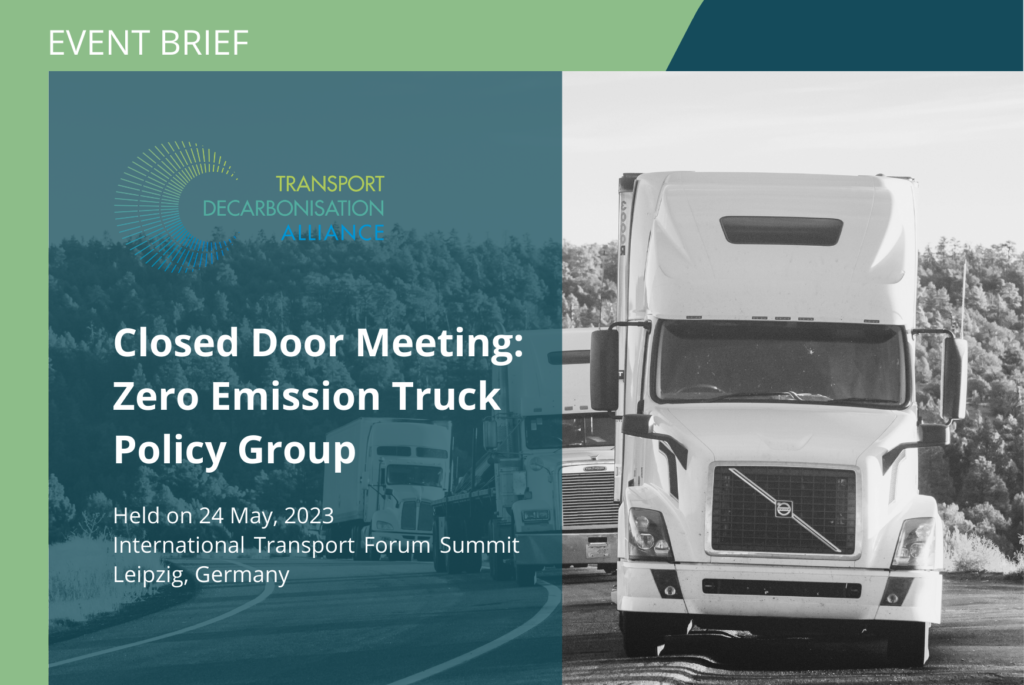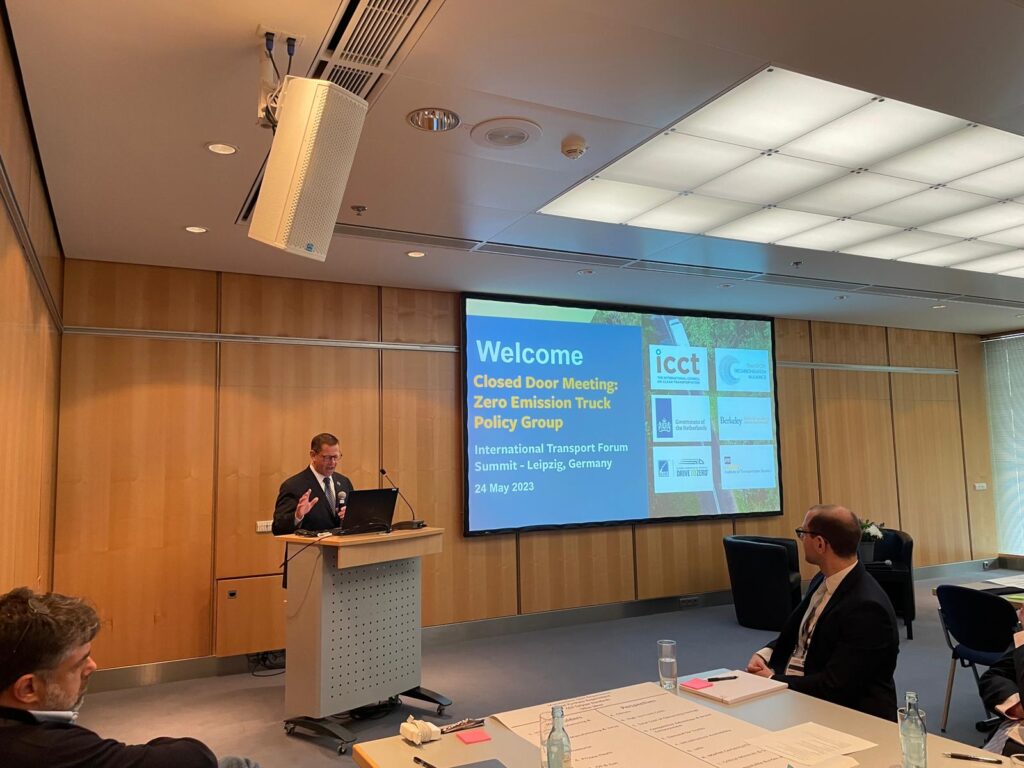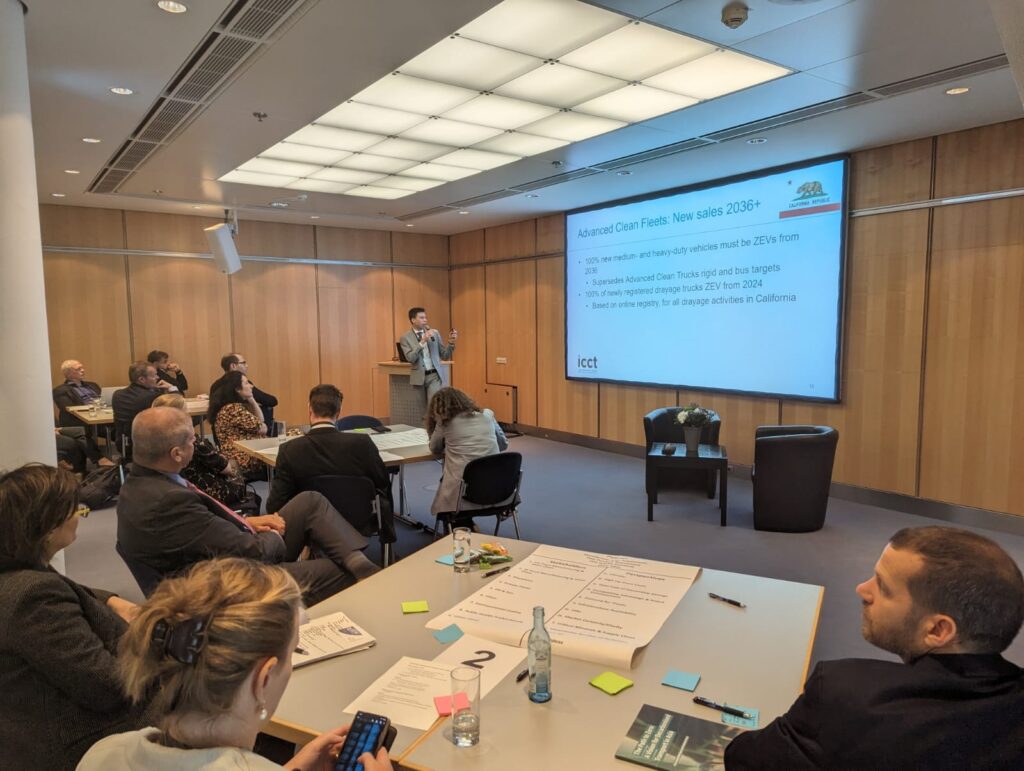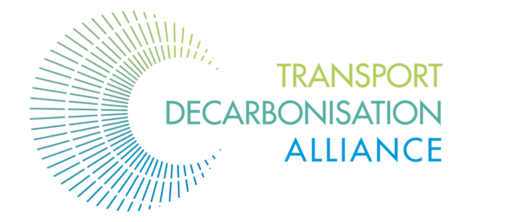Closed door meeting zero emission truck policy group

DISCUSSION SUMMARY


Over two dozen government, academic, and nonprofit representatives gathered to discuss how to navigate stakeholder perspectives on zero-emission truck regulations.
Speakers provided an overview of policy approaches for transitioning the truck market to zero emissions and outlined the main categories of stakeholders and their perspectives, including a review of relevant facts. Attendees then broke into smaller groups to discuss priority areas of interest for future coordination and learning. There were two overarching outcomes that help frame the rest of the takeaways:
- Agreement that future events highlighting different stakeholders and perspectives will help jurisdictions workshop options for addressing stakeholder input.
- Attendees wanted not only a better understanding of the facts and stakeholder perspectives, but also resources that supported communication with stakeholders.
Regulatory Approaches
Participants noted that international coordination can help mitigate potential risks of an accelerated transformation and ensure the continued consumer and economic benefits of globally competitive truck markets. There were some questions about whether sales or fleet requirements could be effective across varying jurisdictions and an interest in confirming where more ambitious policy mechanisms could be applicable. Attendees felt that pursuing more stringent policy mechanisms would be more feasible with specific preparations, such as developing plans for infrastructure deployment and grid upgrades, or conducting analyses of aggregated truck demand.
There was general agreement that legally binding targets are key to driving the transition. Some countries in attendance had already or were in the process of adopting such targets. Others were still exploring options and while some noted an interest in ambition for climate and clean air reasons, they highlighted the need to conduct stakeholder engagement processes first before commitments could be made. Jurisdictions also pointed to binding targets for government fleets as a priority approach to both show what is possible and help pull the market forward.
Beyond binding regulations, attendees discussed the value of a variety of supporting policies, from road taxes to subsidies to the need for updated electricity regulations. Notably, every discussion group specifically highlighted the promotion of Zero Emission Zones as a crucial opportunity for cities to jumpstart the transformation of trucking and supply chains, with benefits that can go far beyond cities. National and regional efforts should support cities as a path for accelerating first movers with positive ripple effects for the regional economy. (For more information on ZEZ’s, take a look at the Transport Decarbonisation Alliance recently released guide, Zero-Emission Zones in the City: Don’t Wait to Start With Freight!)
Stakeholder Categories
The top three stakeholder categories of interest were: workforce, private fleets, and legacy internal combustion engine (ICE) truck manufacturing. Specific comments were as follows:
- Workforce: Participants were particularly interested in better understanding and exploring policy mechanisms for addressing the skills gap (in manufacturing, maintenance, and charging/refuelling management) as well as ensuring a just and equitable transition.
- Private fleets: While the perspective of larger private fleets was of interest, attendees highlighted small and medium trucking operations as a priority. Policymakers want to ensure that smaller fleets or individual truck drivers do not shoulder disproportionate costs and share equitably in the benefits of the transition. The discussion also recognized that fleet and driver confidence could be increased with evidence and/or demonstration of total cost of ownership savings and technology readiness.
Legacy (ICE) truck manufacturing: Many attendees had already, were planning on, and/or knew that they would likely be engaging with truck manufacturers, their supply chain, and/or their trade organisations. Participants highlighted legacy industry actors as important experts and noted a desire to learn more about technology readiness, manufacturing timelines, and the market demand for zero emission truck models.
Stakeholder Perspective Categories
The top three stakeholder perspective categories of interest were: total cost of ownership, technology readiness, and demand for trucks. The availability of charging/refuelling infrastructure and finance were also among the top priorities, however as these are the two areas of focus for the newly formed ZEVWISE coalition, they need not be a priority for this forum. Specific comments were as follows:
- Total cost of ownership (TCO): Attendees noted that a better understanding of, and tools for communicating about, TCO will be key to success for policymakers interfacing with manufacturers, private fleets, and truck drivers. Participants also highlighted that a deeper TCO discussion could incorporate other related perspectives, including concerns around high up-front costs, the predictability or certainty of savings, and potential private sector benefits like competitive advantage and brand enhancement.
- Technology readiness: Attendees recognized that zero emission truck technology is already feasible for most use cases, however, they wanted more information in order to help answer questions they hear about more niche cases and concerns. This includes understanding hydrogen versus battery applications, where and how the technologies are already sufficient for which duty cycles, as well as how they handle in extreme operation or weather scenarios.
- Demand for trucks: Participants wanted to learn more about current and expected demand for zero emission trucks. This included an interest in hearing from large private fleets and small or medium trucking operations, as well as understanding what other market drivers would contribute to demand beyond regulations.
Outside of these top three areas of focus, attendees also commented on the importance of ensuring a just and sustainable supply of critical minerals and stable, diverse battery supply chains. Some participants noted that country-specific efforts to shorten supply chains and expand domestic production were relevant to the discussion around transitioning the workforce and the legacy ICE truck manufacturing industry. Where appropriate, future events should address the impacts of and connections with the evolving policy and industry of critical minerals and battery supply chains.
Zero Emission Truck Policy Group: Interested Parties To Date
Representatives from a number of countries and regions indicated interest in coordinating around lessons learned and shared challenges for navigating the stakeholder perspectives on zero-emission truck regulations. The subset of interested representatives who were not able to attend, requested a report out on this first meeting and inclusion in future events.
In addition to country and region representatives, the initial meeting was co-hosted by and included speakers from the Transport Decarbonisation Alliance (TDA), CALSTART/Drive to Zero, the Netherlands, International Council for Clean Transportation, the Berkeley Center for Law, Energy, and Environment, the UC Davis Institute for Transportation Studies, and Transport & Environment.
Next Steps and Future Events
Government representatives identified workforce, private fleets, and legacy ICE truck manufacturing as key stakeholder groups of interest and total cost of ownership, technology readiness, and demand for trucks as top perspectives that need to be addressed. Based on this first meeting, participating jurisdictions have two primary goals for future meetings: to connect with and learn from these key stakeholder groups as well as to develop resources for communicating with stakeholders around these priority perspectives. The TDA is planning future meetings to build on this initial discussion as part of New York City Climate Week in September and COP28 at the end of the year. Please reach out to Jennifer Helfrich to learn more.
